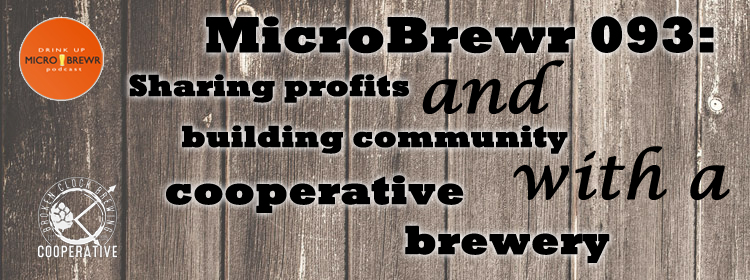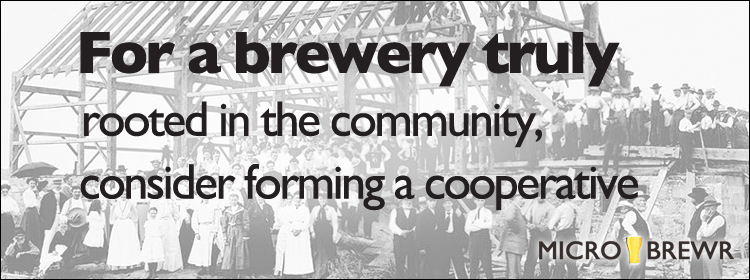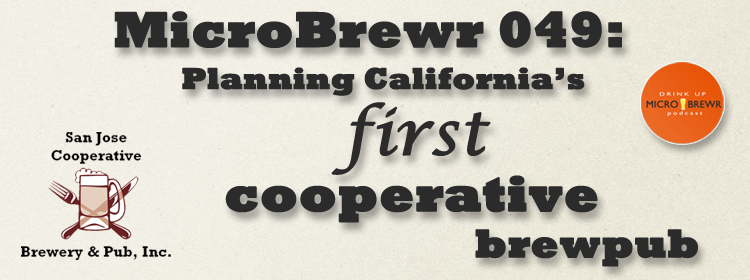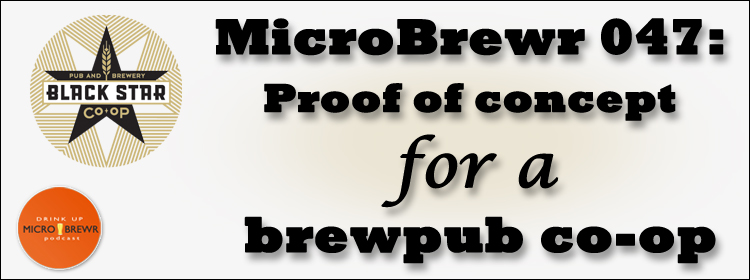MicroBrewr 093: Sharing profits and building community with a cooperative brewery
Podcast: Play in new window | Download | Embed
Subscribe: RSS
William Hubbard and Mike Johnson are helping to build the Broken Clock Brewing Cooperative in Minneapolis, Minnesota. It follows the cooperative brewery business model.
Cooperative breweries are an increasingly popular way to build a local brewery that helps build the community. We’ve previously talked a bit about the subject on MicroBrewr Podcast and blog.
Other posts about breweries as coops:
MicroBrewr: 046: Start your brewery as a worker-owned co-op
MicroBrewr 047: Proof of concept for a brewpub co-op
MicroBrewr 049: Planning California first cooperative brewpub
For a brewery truly rooted in the community, consider forming a cooperative by Sara Stephens, MicroBrewr, February 17, 2015.
Now here’s an example of a cooperative brewery that is up and running, brewing their own beer, splitting the profits, investing in the community, and building a community around the co-op.
The idea of employee ownership, and especially co-ops are becoming quite popular in the craft beer scene. Every cooperative brewery will be set up differently. Here’s one example and lots of ideas for your brewery to follow this model.
Some attributes of the Broken Clock Brewing Cooperative include:
- Established in September 2015, doors opened at the physical location in May 2017.
- The rules of one-person, one-vote and one-person, one-equity share ensure equality and allows inclusiveness.
- The board consists of 15 volunteers from the membership.
- Currently, the only paid positions are 2 operations managers and 4 staff.
There are 2 levels of membership at different costs: Regular or Brewer. Benefits of regular membership include:
- 10% discount on merchandise
- $1-off during monthly pint nights
- Share of profits (3-6% of total profits will be divided evenly)
Brewer members have the additional benefit of being allowed to brew. This benefit is exercised as unpaid/volunteer for work experience or just to have fun.
“Even though we are working a lot more than we probably used to, we are not staring at the clock waiting for the day to be over.” [Tweet This]
Broken Clock Brewing Cooperative took a big step forward when they bought equipment and took over the lease from another brewery. The space has become something of an incubator for breweries. Two previous breweries had grown in size enough to move to larger spaces, so they sold to the next brewery. Now Broken Clock has become successful enough they are considering how to pass the torch to a fourth brewery that could operate in the same location.
Funding for a cooperative brewery can come from a variety of tradition or innovative sources. Broken Clock received funding from:
- Financial donors
- Membership fees
- MNvest, equity crowdfunding for Minnesota
- Financing through a local bank
“Banks were very scared to go with us,” says Hubbard, “there are very few brewing co-ops in Minnesota. So we had to hit the pavement really hard and tell people about our dream, about our vision, and we were finally able to connect with a bank that was willing to work with us.”
We also talked about employee safety in a commercial brewery:
- Working with compressed gas
- Carbon dioxide poisoning
- Heavy-lifting
- Working with chemicals
- Working with steam
- OSHA work safety standards
Minnesota Craft Brewers Guild does have monthly safety meetings. However, worker safety in the craft beer industry isn’t a topic that is broadly discussed. Yet, worker safety should always be a top priority. Loss of work, workers compensation claims, and other liabilities are commercial concerns aside from just taking care of your employees.
As the craft beer industry becomes more prolific and professionalized, expect to see greater attention to this topic.
Brewery specs:
Kettle size: 7 BBL. Boil kettle, 7 BBL mash tun, 10 BBL hot liquor tank.
Size and quantity of fermentation tanks: 3, 10-BBL fermenters.
Size and quantity of bright tanks: 1, 10-BBL brite tanks.
Annual brewing capacity/last year’s production: Should be on track to do 750-800 BBLs this year.
Square footage: 780 sq. ft. for production brewery. Added 5,000 sq. ft. for taproom which opened Nov 2018. At least 1,000 sq. ft. will be allocated to upcoming brewery expansion.
Years in operation: 4 months (at the time of recording; opened May 2017).
Listener question:
From Gastón Rivera via Twitter: Why open a brewery? To brew another IPA or another sour?
Can’t-go-without tool:
Book recommendation:
- Practical Handbook for the Specialty Brewer 3-volume set by Karl Ockert (Editor).
- Brewery Operations Manual by Tom Hennessy.
- Operation Brewery: A Step-by-Step Guide to Building a Brewery on a Budget by Eddie Oldfield, Mike McGovern, and Dan Norris.
Check out the entire list of recommended books, click here.
An upcoming beer style:
New England IPA
Other resources:
- Is Groupon a Good Choice For Your Brewery Marketing Strategy?, Fill Your Taproom.
- 56 Brewing, Minneapolis, Minnesota.
- Minnesota Craft Brewers Guild.
- Maple Island Brewing, Stillwater, Minnesota.
- Wicked Wort Brewing Company, Robbinsdale, Minnesota.
- MNvest, equity crowdfunding for Minnesota.
- Fair State Brewing Cooperative, Minneapolis, Minnesota.
- Blue Nose Gopher Public House Cooperative, Granite Falls, Minnesota.
- Operation Brewery podcast, Black Hops Brewery, Burleigh Heads, QLD, Australia
- Co-op law is different in each state. Be sure to consult your own attorney.
You can reach William Hubbard, Mike Johnson and Broken Clock Brewing Cooperative at:
- http://brokenclockbrew.com/
- Facebook: brokenclockbrewing
- Twitter: BrokenClockbrew
- Instagram: brokenclockbrew
- Untappd: BrokenClockBrewingCooperative
Sponsors:
Support MicroBrewr
Help keep MicroBrewr on the air. CLICK HERE for ways you can help.













